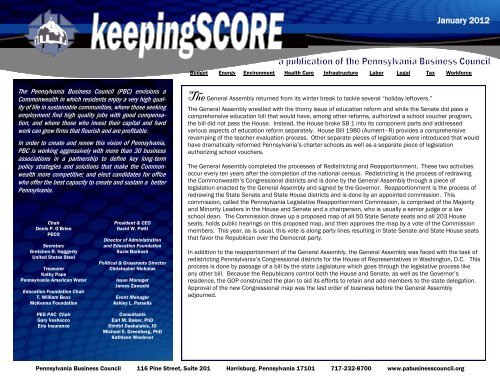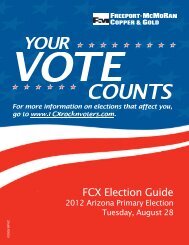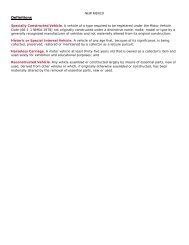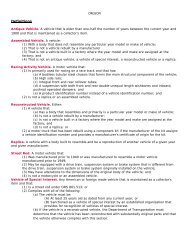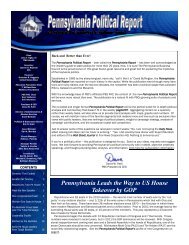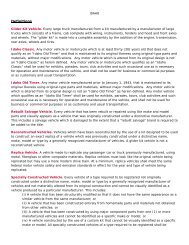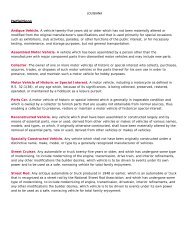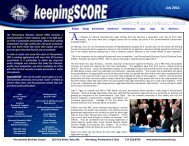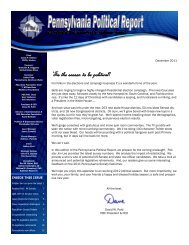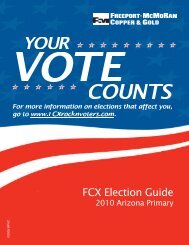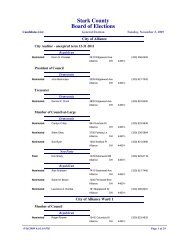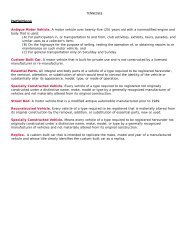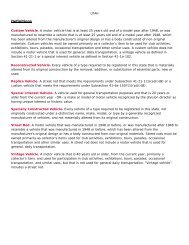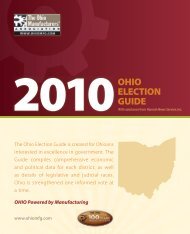keepingSCORE January 2012 - BIPAC
keepingSCORE January 2012 - BIPAC
keepingSCORE January 2012 - BIPAC
Create successful ePaper yourself
Turn your PDF publications into a flip-book with our unique Google optimized e-Paper software.
<strong>January</strong> <strong>2012</strong><br />
Budget Energy Environment Health Care Infrastructure Labor Legal Tax Workforce<br />
The Pennsylvania Business Council (PBC) envisions a<br />
Commonwealth in which residents enjoy a very high quality<br />
of life in sustainable communities, where those seeking<br />
employment find high quality jobs with good compensation,<br />
and where those who invest their capital and hard<br />
work can grow firms that flourish and are profitable.<br />
In order to create and renew this vision of Pennsylvania,<br />
PBC is working aggressively with more than 30 business<br />
associations in a partnership to define key long-term<br />
policy strategies and solutions that make the Commonwealth<br />
more competitive; and elect candidates for office<br />
who offer the best capacity to create and sustain a better<br />
Pennsylvania.<br />
Chair<br />
Denis P. O’Brien<br />
PECO<br />
Secretary<br />
Gretchen R. Haggerty<br />
United States Steel<br />
Treasurer<br />
Kathy Pape<br />
Pennsylvania American Water<br />
Education Foundation Chair<br />
T. William Boxx<br />
McKenna Foundation<br />
President & CEO<br />
David W. Patti<br />
Director of Administration<br />
and Education Foundation<br />
Suzie Barbush<br />
Political & Grassroots Director<br />
Christopher Nicholas<br />
Issue Manager<br />
James Zawacki<br />
Event Manager<br />
Ashley L. Parsells<br />
The General Assembly returned from its winter break to tackle several ―holiday leftovers.‖<br />
The General Assembly wrestled with the thorny issue of education reform and while the Senate did pass a<br />
comprehensive education bill that would have, among other reforms, authorized a school voucher program,<br />
the bill did not pass the House. Instead, the House broke SB 1 into its component parts and addressed<br />
various aspects of education reform separately. House Bill 1980 (Aument–R) provides a comprehensive<br />
revamping of the teacher evaluation process. Other separate pieces of legislation were introduced that would<br />
have dramatically reformed Pennsylvania’s charter schools as well as a separate piece of legislation<br />
authorizing school vouchers.<br />
The General Assembly completed the processes of Redistricting and Reapportionment. These two activities<br />
occur every ten years after the completion of the national census. Redistricting is the process of redrawing<br />
the Commonwealth’s Congressional districts and is done by the General Assembly through a piece of<br />
legislation enacted by the General Assembly and signed by the Governor. Reapportionment is the process of<br />
redrawing the State Senate and State House districts and is done by an appointed commission. This<br />
commission, called the Pennsylvania Legislative Reapportionment Commission, is comprised of the Majority<br />
and Minority Leaders in the House and Senate and a chairperson, who is usually a senior judge or a law<br />
school dean. The Commission draws up a proposed map of all 50 State Senate seats and all 203 House<br />
seats, holds public hearings on this proposed map, and then approves the map by a vote of the Commission<br />
members. This year, as is usual, this vote is along party lines resulting in State Senate and State House seats<br />
that favor the Republican over the Democrat party.<br />
In addition to the reapportionment of the General Assembly, the General Assembly was faced with the task of<br />
redistricting Pennsylvania’s Congressional districts for the House of Representatives in Washington, D.C. This<br />
process is done by passage of a bill by the state Legislature which goes through the legislative process like<br />
any other bill. Because the Republicans control both the House and Senate, as well as the Governor’s<br />
residence, the GOP constructed the plan to aid its efforts to retain and add members to the state delegation.<br />
Approval of the new Congressional map was the last order of business before the General Assembly<br />
adjourned.<br />
PEG PAC Chair<br />
Gary Veshecco<br />
Erie Insurance<br />
Consultants<br />
Earl M. Baker, PhD<br />
Dimitri Daskalakis, JD<br />
Michael E. Greenberg, PhD<br />
Kathleen Woolever<br />
Pennsylvania Business Council 116 Pine Street, Suite 201 Harrisburg, Pennsylvania 17101 717-232-8700 www.pabusinesscouncil.org
Budget Energy Environment Health Care Infrastructure Labor Legal Tax Workforce<br />
DEFINING SUCCESS<br />
Oppose increasing taxes on the job creators. Oppose increasing<br />
the Personal Income Tax rate and the Sales & Use Tax.<br />
Oppose ―Combined Reporting.‖<br />
Cut spending.<br />
Limit General Fund spending growth.<br />
Limit irresponsible debt.<br />
Change the budgeting process.<br />
Reinstate ―sunset‖ review and termination.<br />
Conduct performance audits.<br />
Although the Corbett Administration was able to enact a no tax increase budget in spite of a $4.2 billion deficit,<br />
the work of returning the Commonwealth to fiscal stability is far from complete according to State Budget<br />
Secretary Charles Zogby in his mid-fiscal year review. Zogby said that because of the continuing weakness in<br />
the national economy revenues for the 2011-<strong>2012</strong> fiscal year will be $500 million below estimated levels<br />
and that this anticipated shortfall combined with projected growth of $800 million in Medical Assistance,<br />
debt service, and school employee pension costs will lead to serious budgetary challenges for Pennsylvania<br />
this year and next.<br />
According to Budget Secretary Zogby, the greatest challenges to budget stability are from factors that are<br />
largely beyond the Governor’s control, such as:<br />
The persistent weakness in the national economy. Since the current budget was enacted most<br />
economists have lowered their forecasts for growth in the national Gross Domestic Product from<br />
3.0% in May to 1.7% in December. Forecasts for growth in consumer spending and for wages and<br />
salaries have also been revised downward.<br />
The ongoing economic crisis in Europe. Uncertainty about the fate of the euro and the European<br />
Union and the growing debt crisis in Europe have created global economic uncertainty and prolonged<br />
stagnation of the US economy and delayed its recovery.<br />
GETTING IN THE GAME<br />
Click here to be directed to the Pennsylvania Office of the<br />
Budget website and explore the mid-year update as well as other<br />
documents that explain the Commonwealth’s budget process<br />
and background. Governor Corbett’s FY <strong>2012</strong>-2013 budget<br />
proposal and materials will be posted here in coming weeks.<br />
Uncertainty over federal funding. Last month’s failure by the Congressional Supercommittee to<br />
trim federal spending triggered automatic sequestration cuts to the states of 8.8% which could<br />
take place in <strong>January</strong> 2013.<br />
Health care cost inflation. In <strong>2012</strong>-13 the cost for Medical Assistance and long-term care costs<br />
alone are expected to be $400 million.<br />
Commonwealth pension costs. Pension cost growth in <strong>2012</strong>-13 budget will be $520 million: $320<br />
million for public school employees’ retirement and another $200 million for state employees’ retirement.<br />
Debt service. This cost is expected to grow by $80 million in <strong>2012</strong>-13, providing additional impetus<br />
for the Administration and the General Assembly to develop a capital spending plan that put<br />
this item on a sustainable path.<br />
The Governor’s Budget address for FY <strong>2012</strong>-13 is scheduled for Tuesday, February 7, <strong>2012</strong>.<br />
Pennsylvania Business Council 116 Pine Street, Suite 201 Harrisburg, Pennsylvania 17101 717-232-8700 www.pabusinesscouncil.org
Budget Energy Environment Health Care Infrastructure Labor Legal Tax Workforce<br />
DEFINING SUCCESS<br />
To be competitive, Pennsylvania businesses must be able to<br />
procure plentiful, reliable, and affordable energy. This requires<br />
the infrastructure and regulatory climate that fosters generation,<br />
transmission, and distribution systems throughout the<br />
Commonwealth. Specifics:<br />
Develop and exploit all energy sources and technologies allowing<br />
market forces to determine eventual ―winners and losers‖<br />
without government favoritism or sanction.<br />
Facilitate the development of Marcellus Shale natural gas<br />
reserves.<br />
Oppose severance tax until the industry is successfully rooted<br />
in the Commonwealth and then consider only in light of competitiveness<br />
with other states.<br />
GETTING IN THE GAME<br />
Call your state lawmakers. Tell them to pass legislation soon<br />
that provides certainty to Pennsylvania’s growing natural gas<br />
industry by setting standards, defining the role of municipal governments<br />
in drilling and industrial operations, and establishing<br />
the parameters of an impact fee. Click here to find the contact<br />
information for your state lawmakers.<br />
Marcellus Shale Impact Fee legislation has been voted in both the House and Senate and appears to be<br />
moving toward a consensus resolution between the two chambers. House Bill 1950, introduced by Rep.<br />
Brian Ellis (R-Butler), passed the House 107-76 with twenty members not voting. Likewise, SB 1100, introduced<br />
by Senate President Pro Tempore Joseph Scarnati (R-Jefferson), providing similar impact fee language,<br />
passed the Senate by a 29-20 vote in November. Both of these bills provide for the assessment of<br />
so-called impact fees which are intended to offset any adverse impacts resulting from drilling for natural<br />
gas in the Marcellus Shale gas fields which underlie a large portion of Pennsylvania. Both of these bills<br />
create a special fund within the General Fund and prohibit any impact fee revenues from being placed in<br />
the General Fund. The Pennsylvania Business Council, Pennsylvania Chamber and others in the business<br />
community have been working aggressively to ensure that any impact fee legislation is competitive with<br />
fees and taxes in other states, and provides a uniform regulatory framework for Marcellus Shale gas wells<br />
preventing individual municipalities from imposing their own ordinances and fees. Legislative leaders are<br />
working on a deal to take to a formally convened conference committee.<br />
House Bill 1294 was adopted by the House in October on a 184–17 vote and now awaits action in the<br />
Senate Consumer Protection and Professional Licensure Committee. This legislation would authorize the<br />
PUC to approve alternative ratemaking mechanisms for regulated utilities, including gas, electric, water,<br />
and wastewater utilities allowing them to begin to recover their capital investments in a more timely way<br />
and enable them to proceed with important Pennsylvania infrastructure improvement. These charges<br />
should be used to make distribution and collection systems that maintain and improve the reliability and<br />
safety of utility services, and that protect the environment of the Commonwealth. The Legislature provided<br />
a similar financing tool – known as a Distribution System Improvement Charge, or DSIC – to water companies<br />
in 1996 and it has been working well. Other states have followed this example and expanded the<br />
authorization for electric, gas, and wastewater infrastructure improvements. The legislation and the PUC<br />
would provide adequate safeguards for customers to just and reasonable rates. Alternative ratemaking<br />
would also protect customers from sudden rate spikes for infrastructure.<br />
The proposed XL Pipeline to transport crude oil from Canadian tar sands in northeastern Alberta to multiple<br />
distribution points in the United States has been halted by President Obama. The XL Pipeline is an extension<br />
of the Canadian Keystone pipeline which was proposed in 2005 by TransCanada Corporation and<br />
completed in 2010 after five years of delays. Construction of the Keystone XL pipeline is supposed to create<br />
at least 20,000 jobs in the US and is supposed to help make America less dependent on oil from the<br />
Middle East. The President blamed his decision on a requirement to reroute the pipeline because the original<br />
route would have passed through the environmentally sensitive Sand Hills of Nebraska. Policymakers in<br />
Nebraska report they would have been able to find an alternative route well before construction would<br />
have reached the state. TransCanada is now considering a route to Texas, rather than the Gulf Coast, that<br />
might not require Federal Government approval.<br />
Pennsylvania Business Council 116 Pine Street, Suite 201 Harrisburg, Pennsylvania 17101 717-232-8700 www.pabusinesscouncil.org
Budget Energy Environment Health Care Infrastructure Labor Legal Tax Workforce<br />
DEFINING SUCCESS<br />
Any state legislative or regulatory policy to reduce greenhouse<br />
gas emissions must stem from federal legislative authority;<br />
be based on sound science; recognize that a diverse<br />
fuel source is a necessary component of Pennsylvania’s<br />
economy; rely on market driven solutions to identify technologies;<br />
and provide sufficient time to bring enabling energy<br />
technologies to market.<br />
As the state moves to finalize a state water plan, and works<br />
to consider and implement regulatory programs from the<br />
variety of basin commissions and compacts involved in managing<br />
water in the Commonwealth, it must be done in a manner<br />
that does not advantage one sector of the economy to<br />
the detriment of another.<br />
In September, the Corbett Administration announced a major reorganization of the Department of Environmental<br />
Protection (DEP). Secretary Michael Krancer and his team evaluated the agency’s existing structure<br />
to assess its operational efficiency, improve coordination, and enhance communication to improve its<br />
ability to protect the Commonwealth’s environmental resources. The reorganization announced in September<br />
is intended to move DEP’s focus back to essential environmental protection practices and permitting<br />
functions. The reorganization at a glance consists of the following points:<br />
<br />
<br />
Office of Oil and Gas Management. This new entity is created by transforming the Bureau of Oil<br />
and Gas Management to provide better oversight of the natural gas industry. The integration of<br />
both central staff and field staff under the same management structure will enhance the uniformity<br />
of DEP’s administration of the oil and gas industries.<br />
Bureau of Environmental Cleanup and Brownfields. The restructuring ensures that all site remediation<br />
activities conducted under PA’s Land Recycling Program are closely coordinated. This<br />
new Bureau will allow DEP to incorporate all aspects of site cleanup under one structure to reflect<br />
environmental cleanup programs statewide.<br />
GETTING IN THE GAME<br />
Keep up-to-date with environmental news by bookmarking DEP’s<br />
newsclips. Click here for the page.<br />
<br />
<br />
<br />
Office of Water Management. This restructured office will integrate programs operating under<br />
the same set of state and federal regulations for a uniform management structure. All of DEP’s<br />
stream restoration will be combined under a new Bureau of Conservation and Restoration to<br />
enhance communication among restoration programs.<br />
Office of Program Integration. This new office will develop and coordinate the implementation of<br />
initiatives and programs within DEP. This office will assist Field Operations by creating a consistent<br />
approach to statewide initiatives and policies.<br />
Office of Pollution Prevention and Energy Assistance. The Office of Energy and Technology Deployment<br />
is restructured and renamed the Office of Prevention and Energy Assistance. This office<br />
will continue to foster the deployment of alternate energy sources plus it will work with regional<br />
staff to reach out and help companies achieve greater pollution prevention, energy efficiency,<br />
and improved compliance efforts.<br />
Pennsylvania Business Council 116 Pine Street, Suite 201 Harrisburg, Pennsylvania 17101 717-232-8700 www.pabusinesscouncil.org
Budget Energy Environment Health Care Infrastructure Labor Legal Tax Workforce<br />
DEFINING SUCCESS<br />
Adopt basic health plans.<br />
Allow association health plans.<br />
Oppose health care mandates.<br />
Promote Health Savings Accounts.<br />
Balance access to innovative therapy with cost-effectiveness.<br />
Require fair health care provider contracting.<br />
Adopt quality measures.<br />
Expand health information technology.<br />
Utilize best practices.<br />
Enact malpractice reform.<br />
Retire the MCARE Fund.<br />
Increase physicians in underserved areas.<br />
Encourage careers in science.<br />
In November of 2011, Governor Tom Corbett announced that the Commonwealth was moving ahead with<br />
the implementation of a key provision of the Patient Protection and Affordable Care Act, the creation of a<br />
state-run insurance exchange. An insurance exchange is an on-line method of shopping for healthcare<br />
insurance intended to make it easier for the millions of people who get coverage individually or who are<br />
covered by small businesses. One advocate who testified in favor of the state-run exchange characterized<br />
health exchanges as ―an Expedia-type of computer function where you would go to shop for health care<br />
from a large variety of providers and then purchase coverage that best fits the needs and budget of the<br />
individual consumer.‖ In addition to being a one-stop shopping spot for health insurance, the exchanges<br />
are the only place where many of the newly eligible health care consumers will be able to apply for the tax<br />
credits that are intended to make the coverage affordable. The existence of an exchange in Pennsylvania<br />
was never in doubt. The Affordable Care Act requires the creation of exchanges in all 50 states but give the<br />
states a choice of either running their own exchange or a Federally-run exchange. After receiving input from<br />
stakeholders at three separate public hearings around the state, it was clear that the preferred choice was<br />
a state-run exchange. Governor Corbett also prefers the state-run exchange over a Federally-run exchange.<br />
Under the federal health care law, states are required to have their exchanges up and operating by <strong>January</strong><br />
1, 2014 or else opt into the Federal exchange. The State Insurance Department is currently working on<br />
a multi-million dollar Federal grant proposal to plan how the exchange would work. The entire process of<br />
establishing a health care exchange is proceeding under the shadow of the United States Supreme Court<br />
agreeing to hear a case challenging the constitutionality of the Patient Protection and Affordable Care Act.<br />
Earlier in December, the Court agreed to hear a challenge brought by the attorneys general for 26 states,<br />
including Pennsylvania.<br />
GETTING IN THE GAME<br />
Click here to download and review an extensive (247 pages)<br />
report on health exchange planning compiled for the Commonwealth<br />
by KPMG.<br />
Pennsylvania Business Council 116 Pine Street, Suite 201 Harrisburg, Pennsylvania 17101 717-232-8700 www.pabusinesscouncil.org
Budget Energy Environment Health Care Infrastructure Labor Legal Tax Workforce<br />
DEFINING SUCCESS<br />
We must increase infrastructure replacement, development, and<br />
funding. Among the goals:<br />
Maintenance of current roads and bridges.<br />
Maintenance of mass transit systems.<br />
Maintenance and expansion of water and sewer systems.<br />
Expansion of energy transmission systems.<br />
Expanded rail systems and intermodal operations.<br />
In April 2011, Governor Tom Corbett created the Transportation Funding Advisory Commission (TFAC)<br />
charged with identifying and debating new and innovative ways to meet the transportation needs of the Commonwealth.<br />
In August, this commission, chaired by Secretary of Transportation Barry J. Schoch, issued its<br />
report detailing the challenges facing the Commonwealth’s transportation. The TFAC report presents a comprehensive<br />
overview of the challenges facing the Commonwealth and provides a recommended funding<br />
package to help meet these challenges. Unfortunately, little or nothing has been done to implement the<br />
recommendation of the TFAC report. As of the end of December, the Governor had yet to make present a<br />
plan for taking action on the TFAC report. Notwithstanding the Governor’s reticence, Senator Jake Corman<br />
(R-Centre) has introduced legislation to implement the recommendations in the TFAC report. Senate Bills<br />
1326, and 1327 introduced in early November contain language implementing the recommendations of the<br />
TFAC report. These three bills are currently in the Senate Transportation Committee awaiting the Governor’s<br />
announcement as to his plans for implementing the TFAC’s recommendations<br />
GETTING IN THE GAME<br />
Help to advance HB 3 which would provide a framework for public<br />
private partnerships (P3s) in Pennsylvania. Click here to send<br />
a letter to your state Representative.<br />
House Transportation Committee Chairman Rick Geist (R-Blair) has been working this year to win passage of<br />
prime sponsored legislation providing for Public/Private Partnerships (P3s) to fund certain long term infrastructure<br />
projects. House Bill 3 authorizes the Commonwealth to enter into partnership agreements with<br />
private firms to provide the capital for a highway construction or maintenance project while the Commonwealth<br />
would maintain ownership of the asset being constructed. The private firm gets a return on its investment<br />
over time, often from tolling. House Bill 3 is currently awaiting final action by the House. PBC and<br />
many in the business community support the legislation and have urged the House to take action ASAP. The<br />
delay in passage is sending a negative signal to those who might invest in Pennsylvania infrastructure.<br />
SAFTEA-LU, which is an acronym for Safe, Accountable, Flexible, Transportation-Legacy for Users, is the Federal<br />
Highway Administration’s main program for distributing Federal money to the states for highway, bridge,<br />
and road construction and maintenance. Federal highway fund authorization usually has a term of six year.<br />
The current authorization expired in 2009 and has been operating under a series of continuing resolutions<br />
since that time. The most recent appropriation for this program is $1.4 billion which US House Republicans<br />
would like to cut by 30 percent. There is a difference of opinion between House Republicans and House and<br />
Senate Democrats. The House Republicans are calling for a five-year $260 billion plan while Democrats are<br />
calling for a two-year, $109 billion plan. Current highway and transportation programs will expire on March<br />
1. House Transportation Committee Majority Chairman John Mica (R-Florida) is expected to bring up legislation<br />
in early February.<br />
Pennsylvania Business Council 116 Pine Street, Suite 201 Harrisburg, Pennsylvania 17101 717-232-8700 www.pabusinesscouncil.org
Budget Energy Environment Health Care Infrastructure Labor Legal Tax Workforce<br />
DEFINING SUCCESS<br />
Limit UC to temporary, partial benefits based on actual earnings<br />
with eligibility restricted to persons unemployed through<br />
no fault of their own.<br />
Fairly compute employer UC contributions through an experience<br />
rating calculation.<br />
Compel those applying for UC benefits to register for employment<br />
search services, counseling and re-training through Pa<br />
CareerLink; and to accept work if it is offered.<br />
Adjust and limit Pennsylvania UC benefits to account for other<br />
benefits such as employer-paid severance benefits.<br />
Create a fair Workers’ Compensation Law that aims to return<br />
employees to productive, gainful employment, while providing<br />
adequate but not excessive benefits for work-related occupational<br />
injuries and illnesses.<br />
Eliminate Project Labor Agreements (PLAs) for Public Projects<br />
Reform prevailing wage law to reflect market realities and with<br />
modern thresholds.<br />
End compulsory unionism.<br />
GETTING IN THE GAME<br />
Help advance a meaningful unemployment compensation bill by<br />
writing to your state representative asking them to communicate<br />
with House Labor & Industry Chairman Ron Miller their desire for<br />
reforms that will reduce costs. Click here to sign an electronic<br />
letter.<br />
Legislation ranging from reform to repeal of Pennsylvania’s 50 year old prevailing wage law took center<br />
stage with the House Labor & Industry Committee. House Bill 1277, introduced by Rep. Scott Perry (R-<br />
Cumberland) provides for an outright repeal of the Prevailing Wage Act. This bill is currently in the House<br />
Labor & Industry Committee and is not expected to gain sufficient votes for passage. Among the other<br />
prevailing wage bills introduced in the House of Representatives are a number of bills that either specifically<br />
exclude political subdivisions from the prevailing wage law or allow municipalities to opt out of the<br />
statute. Among the former are HB 1190 which excludes projects in a Keystone Opportunity Zone from the<br />
statute or HB 1543 which excludes projects on lands owned or held by a historical organization or a nature<br />
conservancy from prevailing wage requirements. Bills allowing political subdivisions to opt out of the Prevailing<br />
Wage Statute include HB 1409 which applies to school districts and SB 796 and SB 820. Other<br />
bills in the state legislature dealing with prevailing wage provide for a temporary suspension of the Prevailing<br />
Wage Statute. Both HB 1135 and SB 792 from June 30, 2011 to July 1 , 2015. Other prevailing wage<br />
bills that have been introduced include HB 1271 and SB 822 which expand the definition of ―maintenance<br />
work‖ to exclude certain projects from the Prevailing Wage Law.<br />
Rep. Sheryl Delozier (R-Cumberland ) introduced HB 927 which is a comprehensive rewrite of Pennsylvania’s<br />
child labor laws that have not been examined since 2002. The House Labor & Industry Committee<br />
held public hearings on Delozier’s bill in August of 2011 but has not brought the bill up for a vote. Another<br />
piece of legislation addressing child labor introduced in 2011 is HB 1548 introduced by Rep. Thomas Murt<br />
(R-Montgomery). This legislation, which passed the House 197-0 in June of 2011, updates and modernizes<br />
Pennsylvania’s child labor laws pertaining to the employment of minors by the entertainment industry<br />
in places where alcohol is served. This bill would require film production companies to obtain a special<br />
permit when employing children in filming in establishments where alcohol is served. This bill is currently<br />
in the Senate Labor and Industry Committee.<br />
Senate Bill 1375 authored by Senate Labor & Industry Committee Chair John Gordner (R-Columbia) passed<br />
the Senate in mid-<strong>January</strong>. The bill would extend unemployment compensation benefits to some 17,000<br />
out-of-work Pennsylvanians. Lacking in the bill are much needed controls to reduce the long-term costs of<br />
unemployment compensation and the related taxes paid by the business. The business community will ask<br />
the House to improve it with cost-saving measures. Pennsylvania owes the Federal UC Fund billions of<br />
dollars. A bill passed in June made improved the situation somewhat, but not sufficiently to reduce the<br />
debt. Senate Bill 1310, also authored by Gordner, would essentially refinance the debt by allowing Pennsylvania<br />
to float bonds to repay the Federal government to avoid penalties. UC taxes would then repay the<br />
bond. Senate Bill 1310 passed the Senate, was sent to and passed by the House, but with amendments.<br />
The Senate must now concur in the House amendments or send the bill to Conference Committee.<br />
Pennsylvania Business Council 116 Pine Street, Suite 201 Harrisburg, Pennsylvania 17101 717-232-8700 www.pabusinesscouncil.org
Budget Energy Environment Health Care Infrastructure Labor Legal Tax Workforce<br />
DEFINING SUCCESS<br />
Enact the ―Fair Share Act‖ to reform joint and several liability.<br />
Implement reforms to reduce frivolous lawsuits.<br />
Provide meaningful product liability reform including a statue<br />
of repose for product liability actions.<br />
Enact reasonable protections for retailers who unknowingly<br />
sell a defective product.<br />
Apply to all tort actions the same ―venue shopping‖ reforms<br />
that have reduced medical malpractice claims.<br />
Balance legal liability from the sale of food products against<br />
customers’ choices to over-indulge in these products.<br />
Work to ensure access to competitive and affordable medical<br />
malpractice insurance.<br />
Amend the Constitution to empower the Legislature to consider<br />
limits on damages.<br />
Amend the constitution to use merit selection, rather than<br />
popular election, for the appointment of state appellate<br />
judges.<br />
―Venue Shopping‖ refers to the practice of filing a personal injury lawsuit in a county other than the venue<br />
where the action originally arose. Venue shopping has become notorious in Pennsylvania with an inordinate<br />
number of personal suits being filed in Philadelphia. Plaintiffs’ lawyers are drawn to the courts in<br />
Philadelphia because they perceive that their clients will receive a better treatment in the Philadelphia<br />
courts than in the courts of their own jurisdiction. House Bill 1976 introduced by Rep. Bryan Cutler (R-<br />
Lancaster) specifies that a plaintiff may file a cause of action against a corporation or similar entity to recover<br />
damages for death or injury to a person in one of the following:<br />
The county where the plaintiff is domiciled.<br />
The county where all or a predominant part of the cause of action arose<br />
The county where the principal place of business of the corporation or similar entity is located.<br />
House Bill 1976 was reported from the House Judiciary and Appropriations Committees on party-line votes,<br />
but not considered for final passage after Southeastern Republicans indicated they would not support the<br />
bill.<br />
The Senate Judiciary Committee is sitting on HB 495 — the ―benevolent gesture bill‖ prime sponsored by<br />
Rep. Keith Gillespie (R-York) that would allow a health care provider, assisted living residence, or personal<br />
care home to express regret or remorse for a patient outcome without the statement being used against<br />
them as an admission of guilt in court. The medical community and business community have been advocates<br />
of this legislation for years. Several studies have found that it could lower the number of malpractice<br />
suits. Many doctors are trained in medical schools and by their lawyers to avoid expressing regret or apologizing<br />
for anything unfortunate that might happen to a patient. This bill passed the House in March, but has<br />
not been considered by the Senate Judiciary Committee.<br />
GETTING IN THE GAME<br />
Help pass HB 1976 that seeks to put an end to ―venue shopping.‖<br />
Click here to send a prepared letter to your state Representative.<br />
Pending in the House and Senate Judiciary Committees are, respectively HB 304 (prime sponsored by Rep.<br />
Gordon Denlinger (R-Lancaster)) and SB 384 (prime sponsored by Sen. Lisa Baker (R-Monroe)) which<br />
would create a ―statute of repose‖ forbidding product liability lawsuits on items manufactured more than<br />
15 years previously. Consideration of this legislation by the Judiciary Committees is a key business priority<br />
for <strong>2012</strong>.<br />
Also pending in the House and Senate Judiciary Committees are, respectively HB 388 (prime sponsored by<br />
Rep. Scott Boyd (R-Lancaster)) and SB 383 (prime sponsored by Sen. Lisa Baker (R-Monroe)) which would<br />
protect ―innocent sellers‖ form liability in cases where they played no role in the design, manufacture, or<br />
training for a product that allegedly caused an injury, death, or damage. Consideration of this legislation by<br />
the Judiciary Committees is a key business priority for <strong>2012</strong>.<br />
Pennsylvania Business Council 116 Pine Street, Suite 201 Harrisburg, Pennsylvania 17101 717-232-8700 www.pabusinesscouncil.org
Budget Energy Environment Health Care Infrastructure Labor Legal Tax Workforce<br />
DEFINING SUCCESS<br />
Maintain the phase-out of the Capital Stock & Franchise Tax.<br />
And then eliminate the tax altogether.<br />
Adopt the Single Sales Factor for the apportionment of corporate<br />
revenue subject to PA’s corporate net income tax.<br />
Eliminate the cap on the deductibility of net operating losses.<br />
Oppose the implementation of ―Combined Reporting.‖<br />
GETTING IN THE GAME<br />
1.) Call Senator Mensch at 717-787-3110 to say ―Thank you!‖<br />
for his legislative tax package. Ask how you can help advance<br />
his legislation as part of this year’s budget process.<br />
2.) Read the ―Delaware Loophole‖ legislation and decide for<br />
yourself whether the good outweighs the bad. You can find<br />
Reed’s legislation on the PBC website by clicking here.<br />
The Senate Finance Committee recently reported out two bills intended to remove two provisions of PA’s<br />
Personal Income Tax (PIT) which are particularly harmful to smaller businesses that pay this tax. Both bills<br />
were re-reported to Appropriations and may well become part of the budget package:<br />
<br />
<br />
SB 562, introduced by Senator Jake Corman (R-Centre), amends the PIT to allow losses in one category<br />
of income to be offset against another category of income. This bill would bring the PIT into line<br />
with the Federal income tax which currently allows such offsets.<br />
SB 1354, introduced by Senator Jake Corman (R-Centre), provides a loss carry-forward provision for<br />
the PIT. This bill will allow a business owner paying the PIT to carry losses forward into future business<br />
years thereby offsetting losses in the early years of a business against income earned in later years.<br />
This bill will also bring PA’s PIT into conformity with the Federal income tax. This bill was also introduced<br />
by Senator Corman and will most likely be referred to the Appropriations Committee for a fiscal<br />
note.<br />
A bipartisan group of House members led by Republican Policy Committee Chairman Dave Reed (Indiana)<br />
and Eugene DePasquale (D-York) introduced legislation in mid-<strong>January</strong> that would seek to ―close the<br />
Delaware Loophole‖ and use the resulting revenue to adopt the Single Sales Factor for the state’s Corporate<br />
Net Income (CNI) tax, phase-in 100 percent deductibility of net operating losses, and eventually reduce<br />
the 9.9 percent CNI rate to something closer to the national average. The tax reforms are much needed<br />
and very much appreciated proposals. But, the business community is wary of granting the state Department<br />
of Revenue so-called ―Add-Back‖ powers to address what some allege are abuses in the way deductions<br />
for interstate transactions are used. The so-called ―Delaware Loophole‖ refers to a practice through<br />
which firms create passive investment corporations in Delaware or other states with no corporate income<br />
tax and then make intra-company payments for royalties or interest thereby reducing tax liability in high<br />
business tax states like Pennsylvania. The practice is completely legal. Critics, however, argue that intracompany<br />
payments made across state lines for no business purpose other than the avoidance of tax liability<br />
should be curtailed. The Rendell Administration recommended and pursued mandatory unitary combined<br />
reporting — essentially tax all business transactions wherever they occur — as a remedy. Reed and<br />
DePasquale’s proposal would empower the Department of Revenue to make case-by-case determinations<br />
rather than risk a broad policy with wider-ranging and unknown consequences. Reed and his supporters<br />
argue the state Revenue Department will know unfair and inappropriate deductions when they see them<br />
and ―add-back‖ that income to increase the firm’s tax liability. Speaking for many in the business community,<br />
PBC President & CEO David W. Patti explained to the media, ― Add-backs are not as deleterious as<br />
mandatory unitary combined reporting, but the fear and danger is that add-backs could be used in an arbitrary,<br />
capricious way — even a malicious or vindictive manner — by a future Administration. ― Making matters<br />
worse, Pennsylvania has a horrendously slow and unfair tax appeal process. Reed has signaled a willingness<br />
to compromise but legislative leaders have stated a desire to move some version of the bill.<br />
Pennsylvania Business Council 116 Pine Street, Suite 201 Harrisburg, Pennsylvania 17101 717-232-8700 www.pabusinesscouncil.org
Budget Energy Environment Health Care Infrastructure Labor Legal Tax Workforce<br />
DEFINING SUCCESS<br />
Support the Center for Advanced Manufacturing Careers and<br />
similar efforts to provide a trained workforce for Pennsylvania’s<br />
manufacturing sector.<br />
Produce more science, technology, engineering and mathematics<br />
(STEM) graduates.<br />
Improve interagency cooperation and state/local coordination<br />
of workforce development policymaking and programs.<br />
Ensure education accountability through common curriculum.<br />
Educate parents, teachers and students about opportunities<br />
in skilled careers.<br />
Increase Career and Technology Education.<br />
Maintain and Fund Industry Partnerships.<br />
Strengthen our community colleges and mandate articulation<br />
with four-year state universities.<br />
GETTING IN THE GAME<br />
Learn more about efforts to improve K-12 education in<br />
Pennsylvania and across America, by reviewing materials at:<br />
Efforts to win passage of comprehensive education reform died in the waning legislative days before the<br />
holiday break. It is unclear whether they can be resurrected.<br />
Senate Bill 1, introduced by Senator Jeffrey Piccola (R—Dauphin) and Senator Anthony Williams (D-<br />
Delaware) with much fanfare at the beginning of the session finally passed the Senate on a 27-22 vote in<br />
October. This legislation, titled the Opportunity Scholarship Act, would expand school choice in Pennsylvania<br />
by creating a voucher program for low-income students in the state’s worst performing schools. The<br />
bill would also increase the state's successful Educational Improvement Tax Credit (EITC) program by $25<br />
million. Scholarships for low-income students will be reserved for students in failing schools for the first<br />
three years, and then expanded to all low-income students across the state. The Legislature has attempted<br />
to pass a school choice program three times since 1995—all have failed. Governor Corbett supported<br />
intent and general outline of SB 1, but insisted on adding several other components to make a comprehensive<br />
reform package. These reforms would have overhauled the state’s charter school program,<br />
providing more accountability. The House was unable to muster the votes to pass the legislation in whole<br />
or in parts.<br />
The House did begin work on another important education reform — the performance evaluation of teachers.<br />
House Bill 1980, introduced at the end of October, replaces the current teacher evaluation system<br />
that permits only two ratings for teachers: ―Satisfactory‖ or ―Unsatisfactory;‖ with a four-level rating system<br />
that rates all school employees as ―Distinguished,‖ ―Proficient,‖ ―Needs Improvement,‖ or ―Failing.‖ The<br />
legislation would also, for the first time, make student performance a criteria for teacher evaluations.<br />
House Bill 1980 was the subject of extensive public hearings by the House Education Committee in early<br />
November and reported out of committee on November 16. The bill, however, was never brought up for a<br />
floor vote before the House adjourned for the holidays.<br />
Commonwealth Foundation Research<br />
www.studentsfirst.org.<br />
Pennsylvania Department of Education<br />
Pennsylvania Business Council 116 Pine Street, Suite 201 Harrisburg, Pennsylvania 17101 717-232-8700 www.pabusinesscouncil.org


